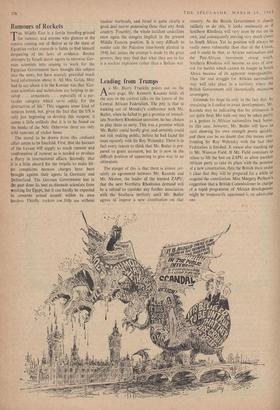Leading from Trumps
As Mr. Harry Franklin points out on the next page, Mr. Kenneth Kaunda holds all the aces in the current talks on the future of the Central African Federatidn. The pity is that in walking out of Monday's conference with Mr. Butler, when he failed to get a promise of immed- iate Northern Rhodesian secession, he has chosen to play them so early. This was a promise which Mr. Butler could hardly give, and certainly could not risk making public, before he had faced the issue squarely with Sir Roy Welensky. There is in fact every reason to think that Mr. Butler is pre- pared to grant secession, but he is now in the difficult position of appearing to give way to an ultimatum.
The danger of this is that there is almost cer- tainly an agreement between Mr. Kaunda and Mr. Nkomo, the leader of the banned ZAPU, that the next Northern Rhodesian demand will be 'a refusal to consider any further association with the Southern territory until Mr. Butler agrees to impose a new constitution on that country. As the British Government is clearly unlikely to do this, it looks ominously as if Southern Rhodesia will very soon be out on its own, and consequently moving very much closer to South Africa. Yet its position will always be vastly more vulnerable than that of the Union, and it could be that, as African nationalism and the Pan-African movement sweep south, Southern Rhodesia will become an area of con- test for battles which cannot be fought in South Africa because of its apparent impregnability. Thus the real struggle for African nationalism may well take place in a territory where the British Government still theoretically maintains sovereignty.
Grounds for hope lie only in the fact that, by remaining in London to await developments, Mr. Kaunda may be indicating that his ultimatum is not quite final. His walk-out may be taken partly as a gesture to African nationalists back home. In this case, however, Mr. Butler will have to start showing his own strength pretty quickly, and there can be no doubt that this means con- fronting Sir Roy WelenSky with the fact that Federation is finished. It means also standing up to Mr. Winston Field. If Mr. Field continues to refuse to lift the ban on ZAPU or allow another African party to take its place with the promise of a new constitution, then the British must make it clear that they will be prepared for a while to suspend the constitution. Miss Margery Perham's suggestion that a British Commissioner in charge of a rapid programme of African development might be temporarily appointed is an admirable one.














































 Previous page
Previous page